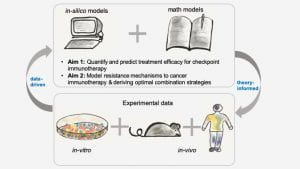
It is of fundamental importance to understand the key mechanisms that govern the progression of cancer and elucidate the often-unknown factors that account for treatment failures. Immunotherapies have had a significant impact, but only in a minority of late-stage lung cancer and melanoma patients. While potentially curative immunotherapies are being rapidly developed and tested, a major barrier is the lack of quantitative models to describe and evaluate their efficacy.
This project proposes to explore clinically relevant mathematical (math) andin-silico models of cancer cell dynamics for personalized immunotherapy that boost anti-tumor activities of effector immune cells using single-agent checkpoint blockade and their potential combinations. Very recently, a wealth of immune-related biomarker data has become increasingly available—their close integration with mechanistic, mathematical models would unleash their explanatory and predictive power in treatment response and outcome. This project will leverage these biomarker data to infer and quantify key parameters that govern cancer-immune interactions. To this end, this project will focus on exploring clinically relevant mathematical and in-silico models of cancer cell dynamics for personalized immunotherapy that boost anti-tumor activities of effector immune cells using single-agent checkpoint blockade and their potential combinations.

